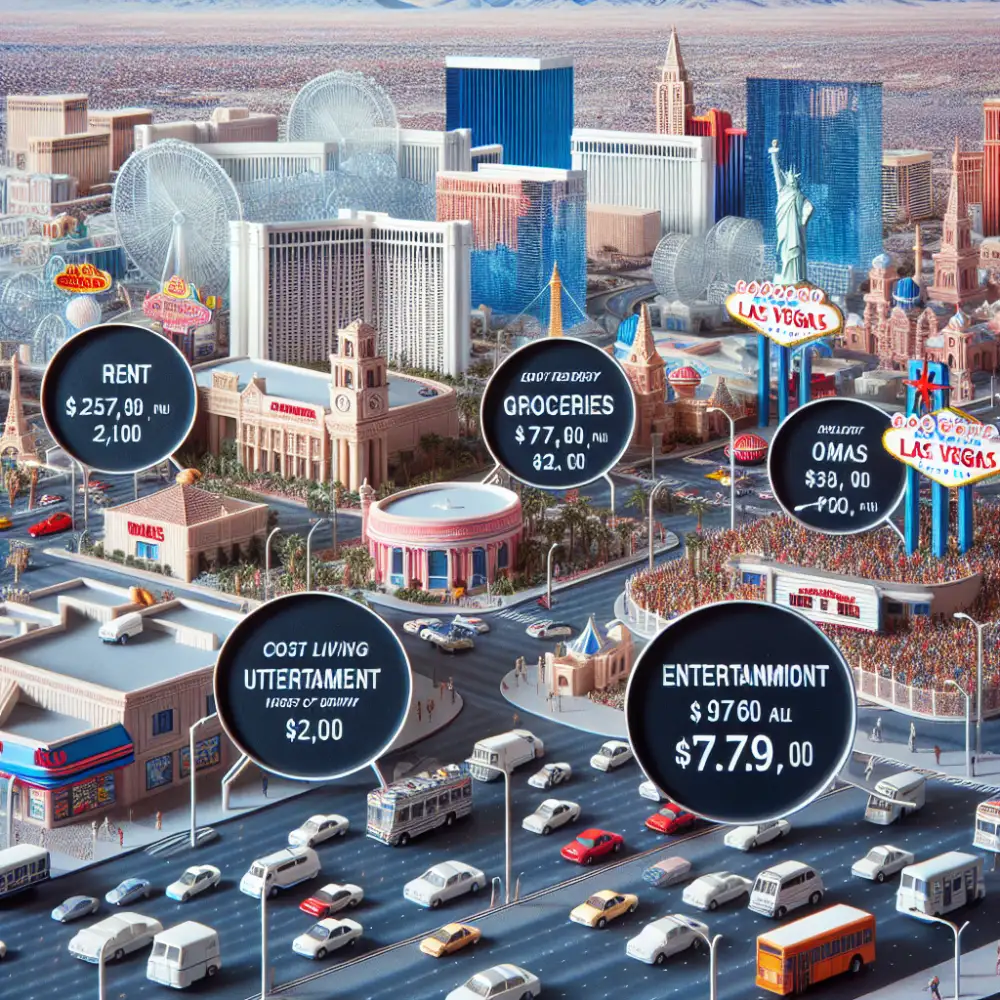Living in Las Vegas Headline: Las Vegas Cost of Living: What to Expect in Sin City

Housing Costs
Las Vegas might be known for its bright lights and entertainment, but the cost of living, especially housing, has been on the rise. Renters and buyers are facing a competitive market. The median home price in Las Vegas is above the national average. Rent prices have also been steadily climbing. A one-bedroom apartment can cost you over a thousand dollars per month, depending on the location and amenities. Luxury apartments in upscale neighborhoods will naturally command higher prices. Don't forget about additional housing expenses like utilities, which can fluctuate depending on the season. The desert climate means higher air conditioning costs during the scorching summer months. Property taxes, homeowner's insurance, and potential HOA fees are also factors to consider when budgeting for housing in Las Vegas. It's essential to research different neighborhoods and weigh the options carefully. While some areas might offer lower rents, they might come with trade-offs like longer commutes or fewer amenities.
Utilities
Las Vegas shimmers with bright lights, but those lights need power, and that power shows up on your utility bills. Expect to pay around $150-$250 per month for electricity, depending on the size of your home and your energy usage. Summers in Las Vegas are scorching, so cranking up the AC is a must, but be prepared for a higher bill. Natural gas, used primarily for heating, averages around $50-$100 per month during the cooler months. Water bills in Las Vegas are surprisingly reasonable, thanks to the city's efforts in water conservation. You can anticipate paying around $30-$60 per month for water. Trash and recycling services will set you back about $25-$40 per month. Internet service is essential for staying connected, and you'll find various providers offering plans ranging from $50 to $100 per month. Factor in your cell phone bill, which can range from $50 to $150 per month depending on your plan and usage. While the allure of the Las Vegas Strip is undeniable, remember to budget for these essential utilities to ensure a comfortable and enjoyable experience in the Entertainment Capital of the World.
Transportation
Las Vegas, known for its dazzling lights and entertainment, might surprise you with its transportation costs. While owning a car is common, navigating the city without one is entirely possible. The Regional Transportation Commission of Southern Nevada (RTC) operates an extensive public transportation system that includes buses and a monorail serving the Strip and downtown. A single-ride bus fare is $2, and a 24-hour pass is $8, making it a budget-friendly option for residents.
If you prefer the convenience of ride-hailing services, Uber and Lyft are readily available throughout the city. However, expect surge pricing during peak hours and events. Owning a car in Las Vegas comes with its own set of expenses. Gasoline prices tend to be slightly higher than the national average. You'll also need to factor in car insurance, parking fees, and potential maintenance costs.

Las Vegas traffic can be congested, especially during rush hour and on weekends. Consider your commute time and potential transportation costs when choosing a place to live. Living closer to your workplace or utilizing public transportation can save you both time and money in the long run.
Groceries
The glittering lights and entertainment of Las Vegas can make it easy to forget about the practicalities of daily life, like groceries. However, keeping your pantry stocked is just as important in Sin City as anywhere else. The good news is that grocery costs in Las Vegas are relatively on par with the national average. You'll find a good mix of national grocery chains like Albertsons, Smith’s, and Walmart, alongside regional favorites like Sprouts and La Bonita, offering competitive prices.
Don't be fooled by the abundance of buffets and all-you-can-eat deals - eating out for every meal can quickly drain your budget. Taking advantage of grocery store sales and opting for budget-friendly meal planning can make a significant difference in your overall cost of living. Plus, many grocery stores offer loyalty programs and digital coupons that can lead to additional savings. So, while the allure of the Strip is undeniable, remember that smart grocery shopping is key to enjoying all that Las Vegas offers without breaking the bank.
Healthcare
Las Vegas might be known for its bright lights and entertainment, but it's essential to consider the practical aspects of living here, especially healthcare. The cost of healthcare in Las Vegas is relatively on par with the national average. However, this can still put a dent in your budget depending on your health needs and insurance coverage.
If you're moving from a city with a lower cost of living, you might find healthcare expenses in Las Vegas to be slightly higher. Factors like the availability of specialists and the overall demand for healthcare services can influence prices.
It's crucial to factor in the cost of health insurance, doctor's visits, dental care, and potential emergency medical expenses. Having a solid understanding of healthcare costs and resources is vital for anyone considering making Las Vegas their home.
Childcare
Childcare is a major expense for families in Las Vegas, as it is in most parts of the United States. The cost of childcare varies depending on the age of the child and the type of care provided. According to recent data, the average monthly cost of full-time childcare for an infant in Las Vegas is around $1,000. For a toddler, the average cost is slightly lower, around $900 per month.
| Expense | Las Vegas | National Average |
|---|---|---|
| Median Home Price | $415,000 | $400,000 |
| Monthly Rent (1-bedroom apartment) | $1,200 | $1,100 |
| Utilities (electricity, heating, water) | $180 | $200 |
| Transportation (public transport, gas) | $150 | $175 |
| Groceries | $350 | $400 |
| Healthcare | Varies | Varies |
| Entertainment | $250 | $200 |
These costs can put a significant strain on families' budgets, especially those with multiple children. Many families find themselves having to make difficult choices, such as having one parent stay home from work or relying on extended family for help.

There are some resources available to help families with the cost of childcare in Las Vegas. The state of Nevada offers a tax credit for childcare expenses, and there are also a number of non-profit organizations that provide financial assistance for childcare.
When considering the cost of living in Las Vegas, it is essential to factor in the potential expenses associated with childcare. Families should carefully research and explore the available options to find the most affordable and high-quality care for their children.
Entertainment
Las Vegas is known for its dazzling entertainment, but all that glitz and glamour can take a bite out of your budget if you're not careful. Shows on the Strip, featuring world-renowned musicians, magicians, and acrobatic performances, can easily cost hundreds of dollars per ticket. Even smaller productions and local acts can set you back a pretty penny.
Dining out is another major entertainment expense in Las Vegas. While there are affordable options available, the city is teeming with celebrity chef restaurants and upscale dining experiences that can quickly drain your wallet. Factor in drinks and tips, and a night out can easily turn into a budget-buster.
Of course, no trip to Las Vegas is complete without trying your luck at the casinos. Gambling can be a fun and exciting form of entertainment, but it's important to set a budget and stick to it. The house always has an edge, and those slot machines and blackjack tables can quickly drain your funds if you're not careful.
Beyond the Strip, Las Vegas offers a variety of entertainment options that are easier on the wallet. Free concerts and events are common, particularly at the city's many casinos and resorts. Local bars and clubs often have free or discounted entry on certain nights, and you can find affordable movie tickets at off-Strip theaters.
Living in Las Vegas means you can take advantage of these more budget-friendly options on a regular basis. However, it's important to be mindful of your spending and factor entertainment costs into your overall budget, especially if you plan on enjoying the city's more extravagant offerings.

Taxes
Nevada is one of the few states without a state income tax, which is a big draw for many people considering a move to Las Vegas. This means you keep more of your hard-earned money. However, don't think you'll escape taxes entirely. Nevada generates revenue through other means, including property taxes, sales taxes, and gaming taxes. Property taxes in Las Vegas are relatively low compared to other major cities. You'll pay an annual property tax based on the assessed value of your home. The sales tax in Las Vegas is among the highest in the country. Be prepared to pay a bit more for goods and services. This includes everyday purchases and big-ticket items. While Nevada doesn't have a state income tax, it does impose a gaming tax, a significant source of revenue for the state. This tax applies to all forms of gambling, from slot machines to table games.
Las Vegas is like a glamorous slot machine: it promises a fortune but often leaves you counting pennies.
Zara Hayes
Personal Care
Las Vegas might be known for its dazzling lights and entertainment, but even in the city that never sleeps, personal care costs add up. Whether you're a glamorous showgirl or just a regular resident, budgeting for these expenses is essential. A trip to the salon for a women's haircut can set you back anywhere from $50 to well over $100 depending on the salon's prestige and the stylist's experience. Men aren't off the hook either, with haircuts averaging around $30-$50. And let's not forget about the pampering extras. A relaxing manicure can cost $25-$40, while a pedicure might run you $35-$55. If you're a fan of regular facials or massages, be prepared to shell out a pretty penny, with prices varying based on the spa and treatment. Don't forget about everyday essentials like shampoo, conditioner, soap, and other toiletries, which can easily add up to $50 or more per month. While the glitz and glamour of Las Vegas can be tempting, it's important to factor in these personal care costs when budgeting for your life in Sin City.
Education
Las Vegas, known for its dazzling entertainment, also presents a mixed bag when it comes to education costs. While the cost of living might be lower than some major cities, education expenses can still put a dent in your budget.
Public schools in Las Vegas are managed by the Clark County School District, one of the largest in the nation. While attending public school is free, there are still expenses to consider, such as school supplies, extracurricular activities, and transportation. These costs can quickly add up, especially for families with multiple children.

For those considering private education, Las Vegas offers a range of options, from religious institutions to specialized academies. However, be prepared to shell out a significant amount, as private school tuition can be steep.
Higher education in Las Vegas is anchored by the University of Nevada, Las Vegas (UNLV), a public research university. While UNLV offers a more affordable option compared to private universities, tuition fees, along with living expenses, can still pose a financial challenge for students.
When factoring in education costs, it's crucial to research thoroughly and explore all available options. From financial aid and scholarships to exploring different school districts, there are ways to manage education expenses effectively while living in Las Vegas.
Insurance
Las Vegas might be known for its entertainment and nightlife, but it's essential to remember that it's also a city with everyday living expenses. One such expense is insurance. Like other metropolitan areas, Las Vegas residents need coverage for their health, vehicles, and homes. Health insurance is crucial, and costs vary based on factors like your chosen plan, provider, and individual health needs. Nevada uses the federal health insurance marketplace, offering various options.
Car insurance is another significant expense. Nevada law mandates minimum coverage levels for liability in case of accidents. Factors like your driving record, vehicle type, and coverage choices influence your car insurance premiums. Given the desert climate, comprehensive coverage for potential heat damage to your car is worth considering.
If you're a homeowner in Las Vegas, homeowner's insurance is a must. This insurance protects against damage from fires, theft, and certain natural disasters. Given the risk of extreme weather events, including flash floods and high winds, having adequate coverage is essential. Renters insurance is equally important for those renting apartments or condos, protecting your belongings and providing liability coverage.
When budgeting for Las Vegas living, research and compare insurance options from different providers. Factors like deductibles, coverage limits, and available discounts can significantly impact your overall expenses. By understanding the insurance landscape in Las Vegas, you can make informed decisions and protect yourself financially.
Miscellaneous Expenses
Living in Las Vegas isn't just about gambling and shows, it's about everyday life with its own set of costs. Beyond rent and groceries, miscellaneous expenses can make a dent in your budget. Think about personal care, haircuts, gym memberships, and let's not forget entertainment. Las Vegas is a city that encourages you to enjoy yourself, so factor in those concert tickets, dining out experiences, and the occasional impulsive trip to one of the many attractions.

Don't underestimate the cost of transportation. While public transportation exists, many rely on cars. Gas, insurance, and potential parking fees can add up. If you're a pet owner, vet visits, food, and toys contribute to the miscellaneous column too.
Remember, these costs are variable and depend on your lifestyle. A frugal approach to entertainment and transportation can free up funds for other things. The key is to budget wisely, accounting for both the expected and unexpected costs that come with living in this vibrant city.
Published: 24. 09. 2024
Category: Finance
